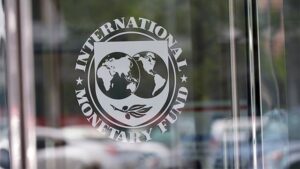
The International Monetary Fund (IMF) has revised downward its forecast for Ukraine’s economic growth in 2025, lowering it by 0.5 percentage points (p.p.) from the previous forecast to 2-3%, according to a press release from the Fund based on the results of the mission for the seventh review of the Extended Fund Facility (EFF).
“Real GDP growth is estimated at 3.5% in 2024, but is expected to slow to 2-3% in 2025, reflecting unfavorable factors related to labor market constraints, damage to energy infrastructure, and Russia’s ongoing war in Ukraine,” the release said following the staff-level agreement (SLA) on Friday.
Earlier this week, the European Bank for Reconstruction and Development (EBRD) downgraded its forecast for Ukraine’s economic growth in 2025 to 3.5%, while last September it expected it to reach 4.7%.
As reported, the World Bank (WB) in its Global Economic Prospects published on January 17 downgraded its forecast for Ukraine’s GDP growth in 2025 to 2% from 6.5% in the June report, but improved it for 2026 to 7% from 5.1%.
The National Bank of Ukraine also changed its forecasts. Given the security risks and the difficult situation on the labor market, the NBU lowered its real GDP growth forecast for 2025 from 4.1% to 3.6% in late January, while the state budget for 2025 is based on a 2.7% GDP growth forecast.
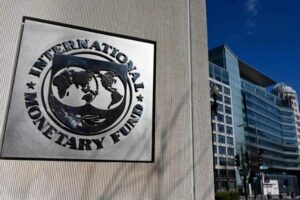
Ukraine has received $1.1 billion from the IMF, Prime Minister Denys Shmyhal said.
“This is the sixth tranche under a joint program under the EFF Extended Fund Facility,” Shmyhal wrote on his Telegram channel.
According to him, the funds have already been transferred to Ukrainian accounts and will be used to finance critical budget expenditures.
The Prime Minister said that Ukraine has already received $9.8 billion from the IMF under this program.
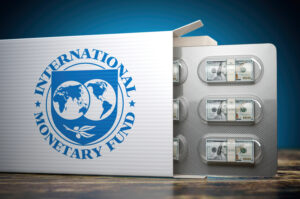
The International Monetary Fund (IMF) expects Ukraine’s current account deficit to widen from 5.4% of GDP in 2023 to 8.1% and 14.3% of GDP in 2024 and 2025, respectively, according to the updated World Economic Outlook (WEO) released on Tuesday.
Earlier, in June of this year, the Fund estimated the current account deficit next year at 5.8% of GDP, and in 2026 – at 6.9% of GDP.
The IMF attributes the widening of the current account deficit to the persistent need for imports during the war, the impact of labor shortages on exports, and a decrease in grant funding. In the Fund’s view, these negative factors will outweigh the favorable impact of improved shipping routes, private remittances, and debt restructuring.
In the materials published after the fifth review of the EFF Extended Fund Facility program, it is noted that the current account deficit in the first half of 2024 increased to $8.6 billion compared to $1.8 billion in the first half of last year. The IMF cited a decline in grants from partners as the main reason.
Meanwhile, the trade balance in goods deteriorated by 8% yoy as high imports from the defense and energy sectors offset exports (especially of agricultural products and iron ore). The balance of services, on the other hand, improved with the end of the border blockades and a reduction in cash withdrawals by Ukrainians abroad.
The IMF predicts that after falling by 15.4% in 2023, exports will grow by 15.7% in 2024 and by another 6.2% in 2025. At the same time, imports, which grew by 21.5% in 2023, will increase by another 14.4% this year and by 7% next year.
According to the Fund’s estimates, the growth of foreign direct investment this year will slow to 2% of GDP from 2.6% of GDP last year, and in 2025 it will only slightly accelerate to 2.1% of GDP.
At the same time, thanks to the continued significant external financial support, the IMF forecasts that the country’s reserves will grow from $40.5 billion last year to $42.6 billion this year and $44.9 billion in 2025.

The IMF Board of Directors on Friday completed the fifth review of Ukraine’s EFF Extended Fund Facility (EFF) program, allowing Ukraine to receive about $1.1 billion (SDR834.9 million) of the 6th tranche, which will be used for budget support.
“Despite the challenging environment, Ukraine’s economy remains resilient and EFF performance remains strong. As of end-June, the authorities had met all quantitative performance criteria and achieved the four structural beacons,” the Fund said in a press release on its website.
After the discussion, IMF Managing Director Kristalina Georgieva said that the total external financing under the 4-year program is raised from $122 billion to $151 billion in the base case and from $144 billion to $187 billion in the negative case due to new commitments under the G7 initiative to allocate $50 billion to Ukraine from the proceeds on frozen Russian assets (“Emergency Loans to Accelerate Ukraine’s Revenue Growth”, ERA).
It is stated that sustainable reforms, mobilization of domestic revenues and timely provision of external support are necessary to ensure macroeconomic stability, restore fiscal and debt sustainability and enhance institutional reforms.
It is specified that the structural beacons related to the abolition of tax exemptions, war-affected state-owned companies, customs reform and public investment management have been implemented, while the implementation of two structural beacons has been postponed to allow more time to complete the reform.
The IMF noted that the economy has been more resilient than expected in the first half of 2024, thanks to continued growth, moderate inflation, and adequate reserves backed by significant external support. However, the outlook for the rest of the year and 2025 has deteriorated since the fourth review, mainly due to prolonged Russian attacks on Ukraine’s energy infrastructure and uncertainty over the war.
“Overall, the outlook remains exceptionally uncertain,” the Fund emphasized.
Georgieva said that all quantitative performance criteria are expected to be met at the end of September as well.
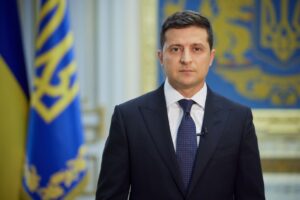
Ukrainian President Volodymyr Zelenskyy, before the IMF Board of Directors made a positive decision on the allocation of $2.2 billion to Ukraine for the fifth tranche under the EFF extended financing program, signed the law on resetting the Bureau of Economic Security (#3840-IX), the adoption of which was one of the structural beacons of the program.
Information about the signing of the document by the head of state is posted on the website of the Verkhovna Rada.
“An important step forward was the adoption last week of the law on reforming the Bureau of Economic Security of Ukraine. It is necessary to quickly and decisively implement this law”, – said the head of the mission of the International monetary Fund (IMF) in Ukraine Gavin Gray at a press conference on Friday evening after the allocation of the tranche to Ukraine.
As reported, the Verkhovna Rada on June 20 by 239 votes with the required minimum of 226 votes adopted the law on the reset of the BEB. “The text is agreed with partners. With independent selection of the new head of the BEB, recertification and personnel selection. With the participation of foreign experts and Ukrainian business. It could have been better, but already well done,” – commented on the adoption of the first Deputy head of the relevant Committee of the Rada Yaroslav Zheleznyak.
According to him, according to the document, the new head of the BEB is selected by a commission of six members, half of whom are international experts with the right to a casting vote. Re-certification is carried out by a commission of six people each from the newly elected BEB director and from international partners, but at the suggestion of the Ukrainian business community. In addition, a Personnel Commission created according to the same scheme will work for the next three years.
“Guaranteed independence of the BEB director at the level of NABU/SAP/NAPK. And many more important changes about the independence of the institution. It is always possible more and better, but in general very ok”, – summarized Zheleznyak.
BEB reboot, IMF, LAW, ZELENSKY
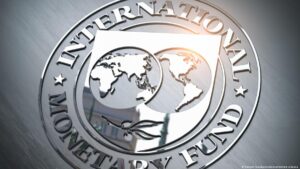
The International Monetary Fund (IMF) has worsened its forecast for real gross domestic product (GDP) growth for this year from 3-4% to 2.5-3.5% at the end of the fourth review of the EFF extended financing program, while improving its year-end inflation forecast from 8.5% to 8%.
“We are now seeing clear signs of a slowdown in growth due to deteriorating sentiment as military action develops and also due to power outages,” Gavin Gray, head of the International Monetary Fund (IMF) mission to Ukraine, said at a press conference on Friday evening after Ukraine’s tranche was disbursed.
Risks remain exceptionally high, he said, especially due to uncertainties related to the war and external financing.
According to a publication on the Fund’s website, for next year, expectations for Ukrainian economic growth have been worsened to 5.5% from 6.5%, while maintaining the inflation estimate of 7%.
The IMF also lowered its forecast of Ukraine’s nominal GDP for this year to UAH 7.49 trillion from UAH 7.75 trillion in its March review, and for next year to UAH 8.74 trillion from UAH 8.87 trillion.
In terms of GDP composition, the IMF slightly worsened expectations for net exports, while expecting a larger contribution from domestic demand, private consumption and investment compared to the March revision.
The Fund improved the inflation forecast for the end of this year to 8% from 8.5%, maintaining its expectations for its slowdown to 7%, 5.5% and 5% in 2025-2027, but lowered expectations for real income growth this year and next year: by 1.2 p.p. to 8.6% and by 1 p.p., respectively. – to 8.6% and by 1 p.p. to 6.8%. – to 6.8%.
Also, the fourth revision slightly worsened the unemployment estimate: to 14.8% from 14.5% this year and to 14.3% instead of 13.8% next year.
As for the budget, the IMF has increased the estimate of its deficit (excluding grants) – to 20.9% of GDP from 20.2% of GDP for this year, to 10.4% of GDP from 10.3% of GDP for 2025.
According to the document, expectations for external financing have been improved to 12.1% of GDP from 11.8% of GDP and domestic financing to 2.1% of GDP from 2% of GDP, which should be provided by banks, while the estimate of external financing for next year remained at 6.5% of GDP, domestic – 0.9% of GDP with a reduction in the participation of banks to 0.5% of GDP.
As reported, last year the Ukrainian economy, according to the State Statistics Committee, grew by 5.3% after falling by 28.8% a year earlier, and in the first quarter of this year growth amounted to 6.5%.
On April 25 this year, the NBU worsened the country’s GDP growth forecast for this year from 3.6% to 3%.
The government, when approving the draft state budget for the second reading in early November 2023, projected economic growth this year at 4.6%, but the Finance Ministry recently said it had been worsened to 3.5%, and First Deputy Prime Minister Yulia Sviridenko said in mid-June in Berlin that the forecast had been worsened to less than 4%.